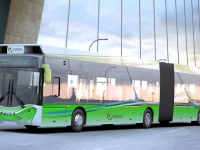Technik
Bus services in Swedish city of Umea rely on electrical mobility.
Fully electric city buses!
GDN -
The northern Swedish city of Umea is increasingly relying on electrical mobility in its local public transport system. The municipal authorities have taken the decision to order eight state-of-the-art, fully electric, low-floor buses. The investment volume amounts to over seven million euro.
The contractor is the Swedish company Hybricon Bus Systems AB; the drive system will be supplied by the German electric motor manufacturer Ziehl-Abegg.
A 12-metre city bus (HAW 12 LE) featuring the in-wheel hub drive ZAwheel, produced by the Künzelsau-based company Ziehl-Abegg, has been running in Umeå between the city center and the airport since 2012. The operating time is 18 hours a day. The University City (115,000 inhabitants/37,000 students) has tested the technology in two respects: Does the electric city bus that has been optimized for cold temperatures by Hybricon keep the promises made by the system supplier?
A 12-metre city bus (HAW 12 LE) featuring the in-wheel hub drive ZAwheel, produced by the Künzelsau-based company Ziehl-Abegg, has been running in Umeå between the city center and the airport since 2012. The operating time is 18 hours a day. The University City (115,000 inhabitants/37,000 students) has tested the technology in two respects: Does the electric city bus that has been optimized for cold temperatures by Hybricon keep the promises made by the system supplier?
Has the innovative, gearless drive ZAwheel proven itself under the more difficult temperature conditions in the field test? - "The order for eight electric buses shows that we have developed a safe and reliable solution for electrical mobility in city bus transport," said Jonas Hansson, the Chief Executive Officer of Hybricon. Peter Fenkl, Chairman of the Executive Board of Ziehl-Abegg, added: "We are delighted that Hybricon is able to use our gearless in-wheel hub motor ZAwheel to continue the success story in the local public transport system in Sweden."
The buses have been ordered in two different sizes: three 18-metre vehicles, each with four drive motors (HAW 18 LE 4WD), and five 12-metre vehicles, each with two drive motors (HAW 12 LE). Delivery is due to start in autumn 2014 with the 12-metre buses. In spring 2015, there will be nine fully electric city buses circulating in Umeå. The vehicles will be charged with 650 kW each at three ultra-fast charging stations. The batteries have a power output of at least 50kWh, depending on the route. They will be recharged for three to five minutes per hour, enabling non-stop electrical operation (24/7).
Each city bus will have a small range extender on board, which can run on biodiesel or ethanol and recharge the battery via a generator. This means that each electric bus can still be operated even in the event of a power cut. As the range extenders are part of a modular system, it will be simple to switch to a fuel cell in five years' time.
Hybricon is a young Swedish company with 30 employees in Holmsund, which specializes in the optimization of electric buses for city transport. Some of the employees have 40 years of experience in building electric vehicles.
Hybricon is a young Swedish company with 30 employees in Holmsund, which specializes in the optimization of electric buses for city transport. Some of the employees have 40 years of experience in building electric vehicles.
Für den Artikel ist der Verfasser verantwortlich, dem auch das Urheberrecht obliegt. Redaktionelle Inhalte von GDN können auf anderen Webseiten zitiert werden, wenn das Zitat maximal 5% des Gesamt-Textes ausmacht, als solches gekennzeichnet ist und die Quelle benannt (verlinkt) wird.





